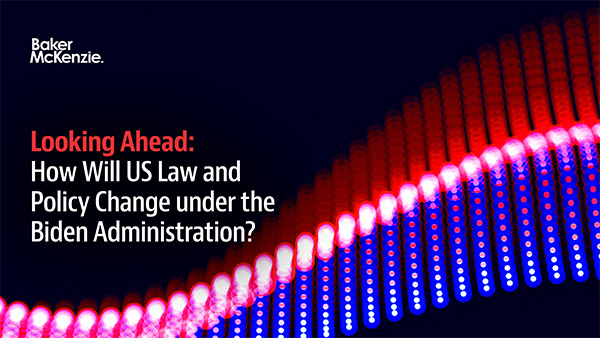As businesses and governments around the world prepare for a new US presidency, Baker McKenzie practitioners are taking a close look at the shifting legal and policy landscape. There are still many unknowns, and following the January 6 attack on the United States Capitol and the second impeachment of Donald Trump, 2021 has left many in Washington with a sense of uncertainty about the future.
Yet in other respects, a clearer picture of the overall political environment has begun to emerge, with the two Senate run-off elections in Georgia going to Democrats and President-elect Biden having completed a substantial number of Cabinet appointments.
As a new US president and vice president enter office, Baker McKenzie’s new report, Looking Ahead: How Will US Law and Policy Change under the Biden Administration? offers insights from partners various areas, with commentary on key changes, areas of highest impact, as well as contacts for more information.
The report also raises and answers the following questions:
- One of the Biden administration’s immediate priorities is environment and climate change. What will he focus on first?
- How likely are we to see an increase in the corporate tax rate or the GILTI tax rate during the Biden presidency?
- How will the Biden administration change companies’ obligations to employees?
- Which immigration policies will the Biden administration focus on first?
- What are the big changes coming in the healthcare sector both related to the pandemic and otherwise?
US Law and Policy Under the Biden Administration: A Conversation
As the Biden-Harris administration enters office, Partners Miguel Noyola and Rod Hunter join Associate Eunkyung Kim Shin for a conversation on the future of commerce, trade, and global cooperation under the new US presidency.






